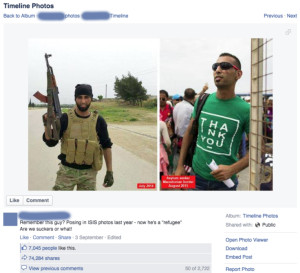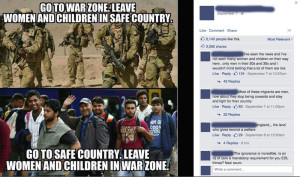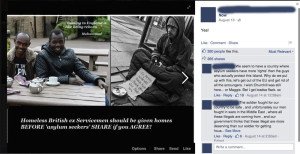Racist memes infest social media
Dozens of overtly racist captioned photographs condemning refugees have appeared on the internet in recent weeks.
Social media sites have become filled with these so called ‘memes’ painting a negative picture of refugees through either wildly false information or photographs being taken out of context.
They appear to have been created by people wanting to keep refugees from entering their borders in the wake of the recent European migrant influx.
The trouble with the reach of online sites is that once something catches a bit of speed, tens of thousands of people can end up sharing a ‘fact’ or image that is completely misleading and damage the plight of the truly defenceless.
The internet has made it possible to turn fiction into fact through the click of a button, by either knowingly creating falsity, or though tapping ‘share’ before checking the legitimacy of what’s being advocated.
Rather than spreading poison, like with any controversial issue, it’s best to do some further research by using the machine that told the lie in the first place.
A reverse image search on an online search engine that uses the input of an image rather than words can show any other time an image has been used and where it originated from.
Through using these search engines to find the images used in memes it’s possible to find out if an image is faked, cropped or taken out of context.
One of the most common memes implies that refugees are terrorists or members of the Islamic State (IS).
 A photo of a refugee is compared against a photo of the same person wearing a military uniform.
A photo of a refugee is compared against a photo of the same person wearing a military uniform.
In reality the person in the photos are often not the same, or were previously in the army.
One such meme is of Syrian asylum seeker Laith Al Saleh pictured in military gear, holding an assault rifle, contrasted against an image of him at the Macedonian border.
A Facebook member posted the two images together with a caption accusing him of being an IS member and calling those sympathetic to refugees ‘suckers’.
The post went viral and was shared over 70,000 times on one Facebook account, spread across twitter, and received thousands of comments.
A quick reverse image search shows that in reality, Al Saleh is a former commander in the Free Syrian Army and was profiled by the Associated Press news agency last month.
Even after such depictions are proved false, they still add to the horrible culture of associating refugees with terrorists.
 Another widely spread trend in racist memes involves pictures of a group of male refugees with captions implying those men have left their women and children behind.
Another widely spread trend in racist memes involves pictures of a group of male refugees with captions implying those men have left their women and children behind.
They are created to dehumanise refugees through claiming that these men are cowards who abandon the most helpless.
The far-right group, English Defence League (EDL), posted a meme on their Facebook page that shows a group of men arriving in Germany with the words ‘…Go to safe country. Leave women and children in war zone’.
Vice writer Philip Kleinfeld researched the origins of the photo to find that it came from a video posted on the CBC News website. The video shows that the group was in fact made up of women, children, and men lovingly embracing those they reported ‘left behind’.
The creation and sharing of such a meme can appear harmless, but in uneducated hands can grow in reach and become a false reality when picked up the media.
 After reports that refugees were staying in hotels due to full British migration centres, a meme became popular that suggested refugees are enjoying themselves in nice hotels while England’s veterans are homeless.
After reports that refugees were staying in hotels due to full British migration centres, a meme became popular that suggested refugees are enjoying themselves in nice hotels while England’s veterans are homeless.
In response, a far-right group asked its Facebook followers to write fake nasty TripAdvisor reviews on the hotels allegedly housing refugees.
The Daily Mail then noticed the reviews and wrote a story titled ‘Brits take to TripAdvisor to warn holiday makers about migrants’.
The clear immediacy in which the online sharing of lies can become ‘fact’ through being picked up by the media is terrifying. Not all can be fooled by silly memes, but many see major news sites as the Holy Grail for honesty and reliability.
It’s not just a bit of fun and games on the internet, false memes shared online can sway public opinion and alter the safety that refugees so deeply need and seek.
Ruby Brown
AMES Australia Staff Writer












